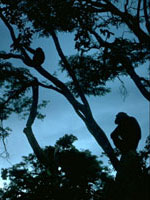HERMOSA BEACH, Calif. (reprinted from gristmagazine.com, art. 1) The first question that must be answered in any self-examination is, “Where am I?”
The air is clear and crisp, high white clouds drift restlessly over a sky-blue sea, verdant cliffs rim the bay to the north and south, and where the noonday sunlight touches down, an explosion of silver shimmers from shore to horizon. This could be Cameroon, and I could be standing on the balcony outside my room at the Atlantic Beach Hotel in Limbe Town.
But I’m not in Cameroon. I’m in California, looking across the Pacific Ocean from my Hermosa Beach home on the south shore of Santa Monica Bay. Physically, that is.
If I were here in mind and spirit, then I would not be at the computer writing. It rained yesterday, and today I can see from Catalina to Malibu, and all the islands between. This is the kind of day when a man of nature ties on his hiking boots and takes off for the hills of Palos Verdes. Or pulls on shorts and sandals and settles in at ocean side with the pipers and gulls. Alas, not I. Not today.
I started my day at 6:30 a.m. with a call to London. Finished two cups of coffee sorting out the FedEx delivery of a book manuscript — and thought about the Thames. Remember how Joseph Conrad started Heart of Darkness; how his narrator, Marlow, began his tale at anchor on the Thames river where he had boarded ship after ship and drifted into uncharted waters seeking adventure, riches, power, meaning? The afternoon had been pleasant enough for Marlow and his friends, but no matter what appeared in daylight, the darkness was there in London, as it is in the Congo, as it is in Los Angeles.
The horror! The horror! I went to Cameroon in 1996 to meet Karl Ammann and learn about the plight of apes and people in equatorial Africa. Since then, no matter how brilliant the sky in whatever part of the world I travel, I experience darkness.
Ammann is the tireless conservation activist who exposed the bushmeat crisis to the world. Within a few hours of our meeting, he had us racing on motorbikes across Bertoua, capital of Cameroon’s Eastern Province, searching for a baby gorilla being held by a meat salesman. Inside a somber mud walled home, I sat on a plush red velvet sofa and held a soft, frightened young gorilla in my arms. The next day she was gone, spirited off before we could organize the gendarmes for a confiscation. By now she is dead. And so is the meat salesman.
The gorilla died of terror and loneliness, as do most infant apes who have witnessed their mother being butchered in the rainforest and cooked for sale in the cities. The man died of AIDS — another all-too-common fate for the people of Africa. Both died young. The horror!
The apes are being extinguished faster than the people. My life is committed to saving them, and their rainforest homelands, from becoming just another commodity in the global marketplace. To do this, we must save the African people too — for they too are being consumed as an expendable resource for the rich and powerful. That is what my manuscript is about — the one that is stuck in some delivery truck on a dark side street of London.
I am certain that tomorrow the package will be delivered and Karl and I will talk about what is needed to complete the second draft. I am not so sure about the deliverance of the animals and people of Africa. They may not get a second chance.
Outside on my balcony, dark clouds are circling in from the southwest. The ocean is gray, and churning. Too late to take this day off. Too much on my mind anyway. Of one thing I am certain: Tomorrow will bring its share of darkness.


